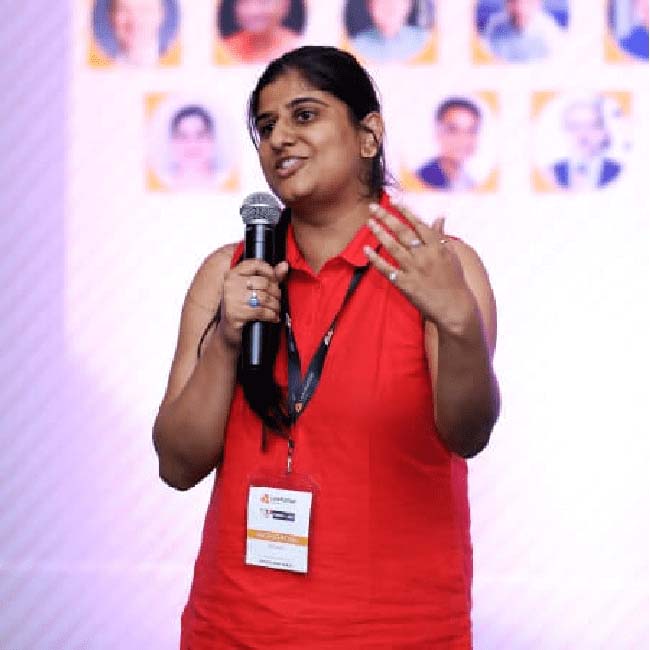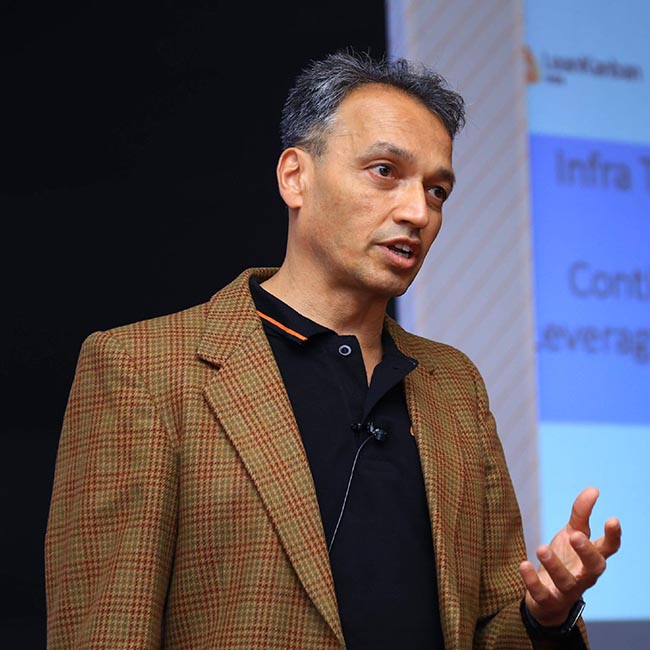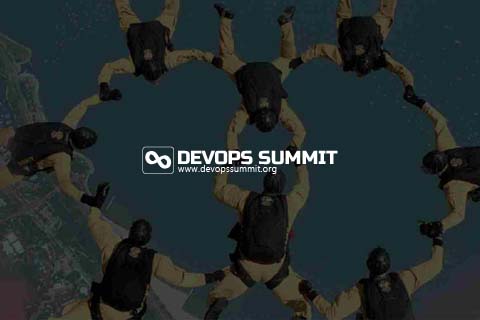

Global Online Scrum Leadership Event
Organizations need to innovate constantly to sustain in the marketplace. It requires a culture of radical innovation and awareness of external factors affecting the business.
Our mission is to address the challenges of the current business environment to innovate, and guide the industry to lead through the volatility by bringing the best knowledge and information from the pioneers and leaders of Scrum, and advance the conversation to actionable ideas.
'Rethinking' is the need of the hour. Our goal is to discover new skills, tools and norms in the current situation to improve the ways of working and life of people.
Join us in exploring ways for Innovation in Scrum.
Global Online Scrum Leadership Event
Find inspiration to overcome the VUCA conditions to redefine the future.
Hear from the best Scrum, Leadership & Management minds.
Gain new insights and embrace new perspectives.
Learn how you can be future ready in changing times.
Join the pioneers and participants from all across the world.
Come together to imagine and define the future, and innovate with Scrum.
Global Online Scrum Leadership Event

Author, Construction Scrum Expert

Certified Scrum Trainer & Agility Coach and Consultant

Author, Scrum for Hardware

Co-Author, Zombie Scrum Survival Guide

Co-Author, The Professional Product Owner Book

Certified Enterprise Coach, Certified Scrum Trainer and Founder, Evelyn Konsult AB
Global Online Scrum Leadership Event


With all the different scaling options that exist today, it may seem like there is very little agreement on how to scale the Product Owner role.
Don McGreal, co-author of the best selling book 'The Professional Product Owner', will introduce five Product Owner Delegation Models (5Ts) that can serve as a guide regardless of what scaling framework may be in place. You will leave this session with a better understanding of the role of Product Owner, especially at scale, and you will have a way to map each model to your existing structure.

Through Industrial Revolutions, Hardware development changed the paradigm and adopted methods and practices from Agile Software Development. What are the key patterns, and how to implement them? We will see case studies of authentic Scrum implementations in Industrial Manufacturing companies, and we will try to open a glimpse in future scenarios. By attending this session, you will see practical examples on how to implement Scrum in Hardware development, and you will:

Learn how to use the Scrum framework to systemically enable continuous improvement. Design and construction projects are complex and typically are delivered late and over budget with dissatisfied customers. Scrum is a management framework built on Lean and Agile principles that enable teams to align, adapt, and deliver projects with high reliability that satisfies customers and builders alike.
Scrum is lightweight and can be adopted during any phase of a project by one person, a team, or several teams regardless of the contract delivery model. Scrum enables people to regularly and incrementally improve their work without overburden or waste. During the session, participants will make personal Scrum boards using notes or digital tools of their choice while learning about Scrum. Some case study examples from design and construction teams will be shared to show how Scrum is being used to remove constraints in LPS, manage work, and support the installation of work in the field.
Felipe Engineer-Manriquez helps implement Scrum with teams worldwide on job sites and in offices alike with typical results including reductions in management work hours while simultaneously increasing successful work throughput. Many teams report 20% schedule improvements, fewer emails, and better communication as a result of using Scrum alone or with other Lean tools like LPS, Takt, 5S, etc. Some teams have even sustained productivity gains of 2X and 3X the levels of their non-Scrum workflows. Join in and learn how to make your first Scrum board with insights gained from working with thousands of professionals.

This talk is based on Evelyn’s experience from coaching organizations large and small, and mentoring agile practitioners globally from over 70 countries.
Globally, many work with Scrum, for years and for decades. Yet, there are so many opportunities for improvements.
She will discuss and share the importance and practices of looking beyond the terminologies, and how we can move towards a value-driven strategy to advance our ways of working, enhance products, and stimulate innovations.



At its core, Scrum is an empirical-based product development process. However, it does not generally encourage innovation primarily due to its structure and "rules." Innovation is better facilitated through design thinking, lean startup concepts, experimentation, and trial and error. Scrum is arguably not well suited for those concepts when people try to internalize them into Scrum. I'll discuss my bases and arguments for my proposition and offer suggestions for alternatives to Scrum for innovation.

While Scrum is most commonly associated with software development, the use of Scrum is becoming increasingly popular in non-software environments. Many of us have heard of Scrum being used for marketing, graphic design, and even support centers, but Scrum doesn't stop there.
In this session, we'll explore some of the more unusual places we've implemented Scrum, including chip design development, hardware product development, and even neuroscience research labs! We'll explore how we adapted Scrum to fit the unique needs and nuances of each different environment, the unforeseen hurdles and pitfalls we faced, and what we discovered along the way.
If you’re facing the challenge of implementing Scrum outside of software, we invite you to learn from our experiences as we share what worked, what didn’t, and why.

Broken Scrum practices limit your organization's ability to take full advantage of the agility Scrum should bring: The development team isn't cross-functional or self-organizing, the product owner doesn't get value for their investment, and stakeholders and customers are left wondering when something--anything--will get delivered. Learn how experienced Scrum masters balance the demands of these three levels of servant leadership, while removing organizational impediments and helping Scrum teams deliver real-world value. Discover how to visualize your work, resolve impediments, and empower your teams to self-organize and deliver using advanced coaching and facilitation techniques that honor and support the Scrum values and agile principles.

Virtually every Scrum implementation is challenged in some way. Scrum Masters generally try to solve these challenges on the team level, which is commendable but rarely effective. There are deep systemic factors within organizations that impede the success of Scrum teams. These impediments are very difficult to solve but making progress on them can unleash a tremendous amount of potential. This helps us create an environment in which Scrum can actually deliver on all its promises.

*The program schedule is subject to change under unavoidable circumstances.
Global Online Scrum Leadership Event

Organizer, Scrum Summit

Organizer, Scrum Summit

Co-Organizer, Scrum Summit
Global Online Scrum Leadership Event
Global Online Scrum Leadership Event
Global Online Thought Leadership Events



Global Online Scrum Leadership Event
200 TICKETS AVAILABLE
Participants from 25+ countries
Global Online Scrum Leadership Event
Global Online Scrum Leadership Event
Meet our supporter
